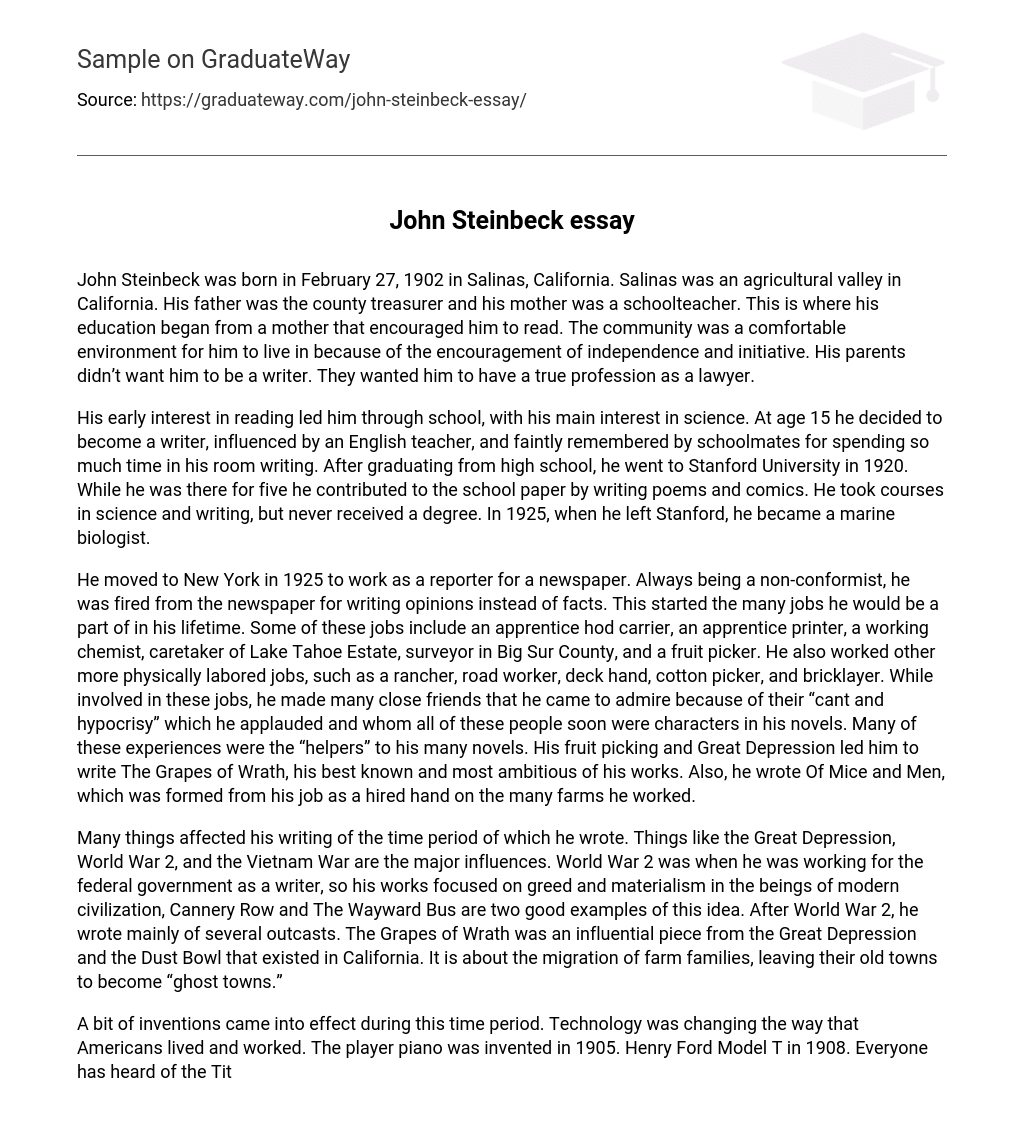John Steinbeck, born on February 27, 1902, in Salinas, California, grew up in an agricultural valley. His father held the position of county treasurer while his mother worked as a schoolteacher. It was through his mother’s influence that he developed a passion for literature. Although his parents hoped he would become a lawyer, Steinbeck thrived in a close-knit community that prized independence and perseverance.
His early interest in reading led him through school, with his main interest in science. At age 15 he decided to become a writer, influenced by an English teacher, and faintly remembered by schoolmates for spending so much time in his room writing.
After graduating from high school, [Name] attended Stanford University in 1920. During his five years at the university, he contributed to the school paper by writing poems and comics and took courses in both science and writing; however, he did not receive a degree.
In 1925, upon leaving Stanford, [Name] pursued a career as a marine biologist.
In 1925, he moved to New York and became a newspaper reporter. However, his non-conformist nature led to him being fired for expressing opinions instead of reporting facts. This marked the beginning of his diverse career, which included various occupations such as apprentice hod carrier, apprentice printer, working chemist, caretaker of Lake Tahoe Estate, surveyor in Big Sur County, and fruit picker. In addition to physically demanding roles like rancher, road worker, deck hand cotton picker, and bricklayer. It was during these jobs that he formed close relationships with individuals he admired for their hypocrisy and pretense; they later became characters in his novels. Many of these experiences served as inspiration for his writings. His time as a fruit picker during the Great Depression notably influenced the creation of his most well-known and ambitious work titled The Grapes of Wrath. Another notable work called Of Mice and Men was inspired by his period as a hired hand on numerous farms.
During the mentioned time period, various factors such as the Great Depression, World War 2, and the Vietnam War influenced the writing. The author’s works were particularly impacted by World War 2 since he served as a writer in the federal government at that time. This experience led him to focus on greed and materialism in modern society. Two notable examples that demonstrate this concept are Cannery Row and The Wayward Bus. After World War 2, marginalized individuals took center stage in the author’s writings. A significant work representing this is The Grapes of Wrath, which portrays the hardships faced during both the Great Depression and California’s Dust Bowl. It illustrates how agricultural families migrated from their hometowns causing these places to become “ghost towns.”
During this time period, several inventions and events greatly impacted American society. In 1905, the player piano was invented, and in 1908, the Henry Ford Model T was introduced. The sinking of the Titanic in 1912 became a famous event that remains well-known to this day. Another significant moment occurred in 1921 with the inaugural Miss America Pageant, which is recognized as a remarkable milestone in history. Unfortunately, economic hardships arose with the onset of the Great Depression in 1928. However, amidst these challenges, there was also a triumph: in 1937, the construction of the iconic Golden Gate Bridge reached its successful completion.
Both John Steinbeck and F. Scott Fitzgerald depicted distinct facets of American society during particular eras. While Fitzgerald focused on portraying the affluent class and delving into their tragic and pitiable essence, Steinbeck explored the development of California, the Great Depression, and the challenges linked to poverty.
John Steinbeck, the author of The Grapes of Wrath (which won him the Pulitzer Prize in 1940) and later awarded the Nobel Peace Prize in 1962, became the sixth American to be recognized with the Nobel Prize in literature. Additionally, his novel Tortilla Flat earned him the California Commonwealth Club’s gold medal for best novel written by a Californian author and was later adapted for theater and sold to Hollywood.
The author’s writings revolved around nature, humor, and empathy towards the oppressed, outcasts, or troubled individuals. He delved into the conflicts arising from his strong bond with nature and his compassion for fellow humans. Through his works, he demonstrated how authenticity and simplicity can have a profound impact on the world. Several of his renowned pieces concentrated on the American experience, shedding light on the adversities faced by impoverished individuals, unique characters, or marginalized communities.
John Steinbeck’s renowned novel, The Grapes of Wrath, published in 1939 and recipient of the Pulitzer Prize in 1940, vividly depicts the heart-wrenching expedition of a family escaping the Dust Bowl. Their pursuit for a brighter future in California tragically ends with disappointment, encountering death, sickness, and starvation instead. In line with his other literary creations, The Grapes of Wrath also achieved triumph as it was skillfully transformed into a beloved film adaptation.
He was married three times and had two sons with his second wife. Their names were John and Tom.
John Steinbeck died in New York City on December 20, 1968 due to natural causes. No evidence of any illness that could have led to his death was found.





